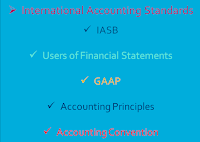International Accounting Standards - IAS - 1
The IAS - 1 standard describes how to
present the financial statements to ensure comparability among:
1. Entity’s Financial Statements
2. Financial Statements of Other Entities
International
Accounting Standards Committee (IASC)
 International
Accounting Standards Committee is an independent body of the accounting
profession. The purpose of this body is to oversee and guide the process of
standard setting decision of IASB. In 1st April, 2001, its authority
was transferred to IASB.
International
Accounting Standards Committee is an independent body of the accounting
profession. The purpose of this body is to oversee and guide the process of
standard setting decision of IASB. In 1st April, 2001, its authority
was transferred to IASB.Note: Auditor or Chartered Accountant is the person who oversees theses Standards in details.
International
Accounting Standard Board (IASB)
This
board is responsible for the issuance of new accounting standards. The purpose
of this board is to guide the standards in order to ensure fair presentation of
financial statements to users of financial statements.
Objective
of IASB
ü To develop high quality, enforceable international accounting
standards
ü To promote and applicability of those standards
ü To make a clear understanding between national and international accounting
standards to ensure fair and use of accounting information.
ü Provide updates and guidelines about the accounting standards
through newsletter.
Scope
of International Standard Board’s Framework
Ø The purpose of Financial Statements
Ø The usefulness of Financial Statement to users of financial
statements
Ø Definition, Recognition and Measurement of elements of Financial
Statements
Ø Capital concepts and its maintenance
The
Standing Committee on Interpretation (SCI)
Such
Committee ensures the applicability of IASs in practical.
Users
of Financial Statements
Users
of financial statements are external users to the financial statements of the
entity. They have interest in the accounting information provided to them in
the form of financial statements.
Following
are the main external users of financial statements
Investors
Investors
are those who invest in the company shares for the probable profits. They are
interested in the profitable conditions of the company.
Creditors
They
provide credit purchases to entity only when the financial statements clearly show
the information that the entity will pay the debts in time.
Employees
Employees
are interested in the profitability of the entity that pay them high rewards
for their service.
Customers
Customers
are interested in the financial statements of entity because they will only
purchase the products from them when these are provided at cheaper rates and
all such information are available from their financial position.
Government
and their Agencies
Government needs the profitability of the enterprise for the
economic stability.
Objective of Financial Statements
To
provide useful information about financial performance, position and changes in
financial position of the entity to external as well internal parties
interested in the information for decision making purposes.
Generally
Accepted Accounting principles (GAAP)
Generally
accepted accounting principles are those which are accepted universally. These
rules are followed by every country irrespective of the region. Separate Entity
Concept, Matching Concept, Materiality and other important accounting principles
are the examples of GAAP.
Accounting
Principles consist of Accounting Concepts and Accounting Conventions.
So International Accounting Standard
- 1 is helpful in the fair presentation of financial statements to parties
interested in it for making economic decisions.
Comments